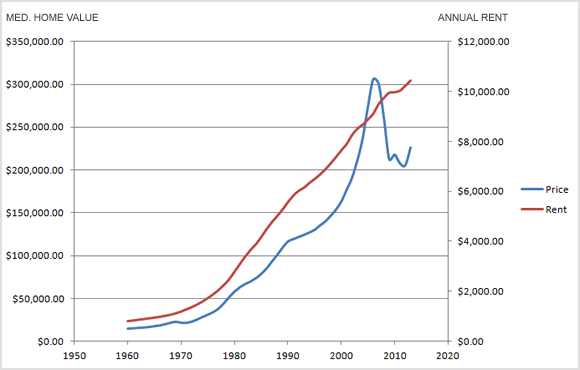The debate between whether to rent a home or own a home goes on in many families in America. While both sides have their pros and cons, the decision usually comes down to a financial one. Is it more financially smart to own your own home or to rent someone else's? Financially speaking, both the average annual rent in the United States and the average home prices have continued to increase over the years. By looking at the rate in which each of these prices has risen over the years, it makes it easier for a family to predict what they will spend over a period of time.

In 1960, the average home price in the United States was $14,444.86 while the average rent for the year was 809.55. Ten years later, the average home price was $21,462.06, while the average rent for the year was $1,195.14. This means that in ten years, the average price of a home increased by $7,017.20 (or 48.6%) and the average yearly rent increased by $385.59 (or 47.6%). The hard number looks vastly different, but looking at the percentage, the two prices jumped the same amount in ten years.
By 1990, the average home price was $116,227.76, which was up $94,765.70 (or 441.5%) in twenty years. The average yearly rent was up to $5,575.29, which was up by $4,380.15 (or 366.5%) in the same amount of time. For this time span, the average home price rose at a higher rate than renting. Today, in 2013, the average home price in the United States is at $226,139.89, which is a rise of $109,912.13 (or 94.6%) in thirteen years. Similarly, the average yearly rent is up to $10,448.09, which shows a rise of $4,872.80 (or 87.4%) in the same amount of time.
Over the course of fifty three years (from 1960 to 2013), the average price of a house has gone up by $211,695.03, or 1465.5%. The average yearly rent has gone up by $9,638.54, or 1190.6%. In this case, there is a difference of 274.9%, with home prices on a faster incline than rent prices. While the numbers themselves look vastly different, it is important to remember that the price of a house is paid out over a number of years, while the number for rent is paid each year. Looking at the current figures for 2013, a person would pay, on average, $10,448.09, or $870.67 per month. If the average home price of $226,139.89 is figured at an interest rate of 3.05% over a thirty year span with a ten percent down payment, a family would be paying $863.57 per month. This means that in thirty years, those who had a mortgage would have paid $310,885.20, but would no longer have to pay anything after that. In the same amount of time, those who rent would have paid $313,441.20, but would also have to keep paying every year.
All in all, both sides end up paying relatively the same amount over a long span of time. While home owners have to take into account taxes and home repairs, after thirty years, their loans will be paid off and they will never have to worry about their monthly payment going up if they have locked into a rate. Inversely, while those who rent would never have to worry about taxes or home repairs, they would have to keep paying for the rest of their lives and depending on their rental agreement, could also have to worry about their monthly payment going up. Despite the fact that the monthly payments do not look that different, it is important to look at the long haul. While the statistics show that renting is less expensive and is increasing at a lower rate, people will always have a monthly payment, even as they get older when their income could substantially decrease when they are no longer working.

